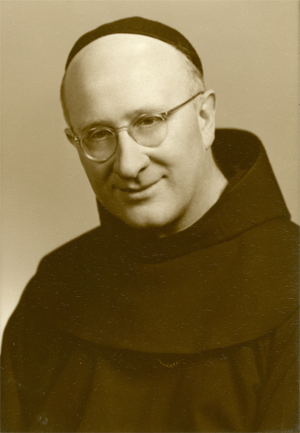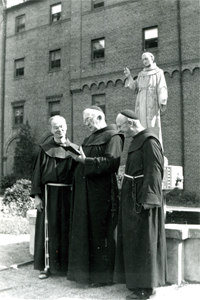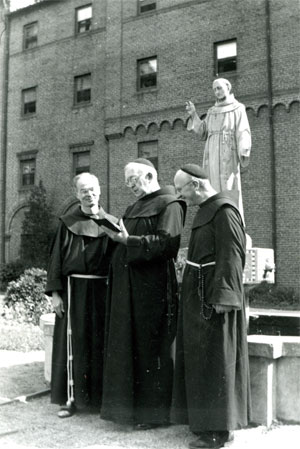Fr. Philotheus Boehner
Thomas Merton's Important People
Click here for a PDF of this page
(Includes references for further reading)
"Boehner" from "A Biographical Register of the Franciscan Institute" in Franciscan Studies 51 (1991) p.153-154 (used by permission of Franciscan Studies) :
Fr. Philotheus Boehner, 0. F. M., 1901-1955 (b. February 17, d. May 22). Professed 1921; ordained 1927. Educated at Dorsten and Paderborn; Munich and Munster (Doctorate in Biology). His dissertation was entitled "Uber die thermonastischen Blutbewegegungen bei der Tulpe," published in Zeitschrift der Botanik 26 (1933): 65-107. His many publications included three translations into German of works by Etienne Gilson: Der heilige Bonaventura, Der heilige Augustinus, eine Einfuhrung in seine Lehre, and Die Mystik des heiligen Bernhard von Clairvaux; also, ChristlichePhilosophie, von ihrem Anfangen bis Nikolaus von Cues (with Etienne Gilson); The Tractatus de successivis Attributed to William of Ockham; The Tractatus de praedestinatione et de praescientia Dei et De futuris contingentibus of William Ockham; William Ockham, Summa logicae; Medieval Logic, An Outline of its Development from 1250 to c. 1400.
He also published numerous articles in such scholarly journals as Franziskanische Studien, Wissenschaft und Weisheit, Archiv fur Philosophie, Recherches de theologie ancienne et medievale, Traditio, Review of Metaphysics, Franciscan Studies, Rivista di filosofia neo-scolastica, and in Encyclopaedia Britannica. After ordination to the priesthood, he taught philosophy for six years at Dorsten, and during this time frequented centers of learning at Quaracchi, Rome and Paris, acquiring a thorough knowledge of current research on Franciscan philosophical and theological texts. In 1939, at the invitation of Etienne Gilson, he lectured in paleography at the Pontifical Institute of Medieval Studies in Toronto. In 1939 he began lecturing on medieval philosophy at St. Bonaventure College where he reorganized some summer courses in Franciscan philosophy into a complete program of Franciscan studies and undertook to edit the works of William of Ockham. In 1941, with Thomas Plassmann, he reorganized the Franciscan Studies from a series of annual monographs into a quarterly journal.
In 1942 these projects were given a corporate name and an organization, The Franciscan Institute, of which Boehner was named the first director in 1946. In 1950-51, with Sister Mary Francis Laughlin, S.M.I.C., he began the publication of The Cord. As professor at St. Bonaventure College, he delivered courses in logic, epistemology and psychology; the philosophies of Augustine, Bonaventure and the Franciscan school; as well as special courses in botany. Boehner's learning was the foundation of the Institute, and he deserves therefore recognition as its founder.
"In Memoriam: Philotheus Boehner, O.F.M., 1901-1955" in Franciscan Studies 15 (1955) p.101-105 (used by permission of Franciscan Studies)
With a deep sorrow and a sense of irreplaceable loss, the members of the Franciscan Institute announce the passing of their co-founder and first Director, Rev. Fr. Philotheus Boehner, 0. F. M. Coronary thrombosis ended the earthly life of Fr. Philotheus shortly after midnight, Sunday, May 22, 1955, terminating a great scholarly career.
Heinrich Boehner was born February 17, 1901, in Lichtenau, Westfalia. He entered the Franciscan Order in 1920, becoming a member of what is now Holy Cross (Saxonia) Province in Germany, and receiving the name Philotheus. He was ordained to the priesthood in 1927. At the time of his ordination he was so ill with tuberculosis that his life was despaired of. However, it was precisely during the long months of rest as a sick man that he began his career as a medieval scholar, for it was then that he translated E. Gilson's work on Saint Bonaventure, and despite many difficulties had the translation published under the title Der heilige Bonaventura, Hellerau, 1929.
Against all expectations Fr. Philotheus completely recovered his health and was sent to the University of Münster (1929-1933) to work for the doctorate in biology. During this time he completed the translation of another book of Gilson's, Introduction à l'étude de St. Augustin, under the title: Der heilige Augustin , Eine Einfuhrung in seine Lehre, Hellerau, 1930. In 1933 Fr. Philotheus received the doctor's degree and published his dissertation, Über die thermonastischen Blütenbewegungen bei der Tulpe, in Zeitschrift der Botanik, 26 (1933) 65-107. Although later it was philosophy that absorbed most of his time, he kept up his interest in botany and was becoming well known in the United States as a bryologist. His collection of mosses, gathered in the vicinity of Cattaraugus County, New York, and his articles in Saint Bonaventure's Science Studies, are noteworthy contributions to bryology. Occasionally he lectured in botany for the biology department at Saint Bonaventure University.
From 1933 to 1939 he was lector of Philosophy for his province, and spent some time in such centers of scholarly activity, as Quaracchi, Rome, and Paris. In 1936 he completed the translation of a third book of Gilson's, under the title of Die Mystik des heiligen Bernhard von Clairvaux, Wittlich, 1936. These translations naturally brought about a close friendship between Fr. Philotheus and Professor Gilson, and eventually resulted in their collaboration on Die Geschichte der christlichen Philosophie, published in Paderborn, 1937. In 1954 this work appeared in its third edition under the title Christliche Philosophie von ihren Anfängen bis Nikolaus von Cues.
Early in 1939 Fr. Philotheus was invited by Professor Gilson to lecture in palaeography at the Pontifical Institute in Toronto. When World War II broke out in September, I939, his friends advised him to leave Canada. At the same time Fr. Thomas Plassmann, O.F.M., then president of Saint Bonaventure College, invited him to give lectures in Franciscan philosophy, and in the summer of 1940 Fr. Philotheus began the work that led to the founding of the Franciscan Institute. From that time on he remained at Saint Bonaventure, gradually building up the Institute into a centre of international Franciscan scholarship. In 1948 the Institute was formally established as a Studium Generale in virtue of the approval of its statutes by the Definitorium Generale in Rome (November 15, 1948), and it was primarily because of the Institute that Saint Bonaventure College was raised to status of University in 1951.
Fr. Philotheus was an excellent lecturer in logic, in the philosophy of Saint Augustine and Saint Bonaventure, in epistemology, and especially in the philosophy of William Ockham. His penetrating and challenging observations, his sure grasp of the subject under discussion, and above all his placid and subtly humorous presentation of disconcerting facts gave his lectures a distinction and charm that never failed to impress those who had the ability to follow them. It is interesting to note that one of his first students is the now famous Trappist-author Thomas Merton.
Fr. Philotheus was known primarily, however, through his writings. He contributed numerous articles to various learned journals, such as Franziskanische Studien, Der katholische Gedanke, Bonifatius-Korrespodenz, Wissenschaft und Weisheit, Archiv für Philosophie, Recherches de Théologie ancienne et médiévale (Louvain), Traditio (New York), Review of Metaphysics (Yale), Franciscan Studies, Rivista di Filosofia neo-scolastica, etc. In 1941 he helped reorganize Franciscan Studies on a more scholarly basis. It has continued in its revised form through fourteen volumes, and during this time has steadily grown in reputation and influence. And, although Fr. Philotheus resided in the United States (1939-1955), he was still retained on the editorial board of Franziskanische Studien and Franziskanische Forschungen.
Of far greater importance, however, is the output of scholarly publications that has issued from the Franciscan Institute. Within the space of ten years, 1944-1955, Fr. Philotheus saw the appearance of more than thirty volumes. To facilitate publication, he divided the Franciscan Institute Publications into five series: Philosophy, Theology, Texts, History, and Missiology. Fr. Allan B. Wolter was placed in charge of the Philosophy Series (II volumes published), Fr. Eligius M. Buytaert in charge of the Theology Series (4 volumes published; one volume in press) and the Text Series (10 volumes published, 3 in press); but Fr. Philotheus remained in general control of all the series, including the more popular collection "Spirit and Life Series" now directed by Fr. Ignatius Brady (nine volumes published thus far).
Besides his publications for the Franciscan Institute (Philosophy Series 1 and 2; Text Series 1, 2 vol. 1-11, 9; Spirit and Life Series 3, of which the second edition is now in press), Fr. Philotheus also wrote Medieval Logic, An Outline of Its Development from 1250 to c. 1400, Manchester and Chicago, 1952, in which he showed indirectly that neo-scholastic logic is basically different from the logic of the Middle Ages. Another book, The Life, Writings and Teachings of William Ockham is now being published by Thomas Nelson of Edinburgh. And at the time of his death Fr. Philotheus was preparing several more works for publication.
In 1939 Fr. Philotheus published the first Quaestio of the prologue of Ockham's Ordinatio (F. Schöningh, Paderborn). He was planning at that time to publish the whole of Ockham's commentary on the Sentences, but the war destroyed his plans. As soon as he was settled at Saint Bonaventure, however, he could again take up the work, and with the collaboration of Professor Ernest Moody he began to prepare the long-awaited critical edition of Ockham's Opera omnia theologica et philosophica (the Opera non-politica). When the first volume went to press a few months ago, Fr. Philotheus saw the beginning of the fulfillment of his most cherished ambition. The entire edition is intended to include some twenty-five volumes. Most of the work would have remained in the hands of Fr. Philotheus, although he took care to surround himself with a staff of highly competent collaborators including Professors Eligius M. Buytaert, O.F.M. (since 1954 co-editor of the entire collection), Gaudens Mohan, O.F.M., and Ernest Moody. In fact, Moody prepared the volume now in press, Expositionis in libros artis logicae prooemium et Expositio in libros Porphyrii de Praedicabilibus.
What effect Fr. Philotheus' untimely death will have on the progress of this work cannot be determined at the moment, but it is obvious that the scholarly world has suffered a great loss. In the difficult and little known field of fourteenth century philosophy and theology Fr. Philotheus was both pioneer and master in research.
Fr. Philotheus was an eminent scholar, and his reputation is so generally established in scholarly circles that little need be said of it here. But he was also and above all a great priest, and this fact is not so generally known. He was a true Franciscan. Eagerly and lovingly he drew spiritual nourishment from the richest sources, the writings of the great masters of Franciscan theology and philosophy and sharpened his spiritual acumen through the strict discipline of scientific study. Thus he moved through life with the serenity and freedom of action that marks the children of God. He was a genuine lover of nature. He looked upon the beauty of the natural world not only with the trained and appreciative eye of the scientist, but also, like Francis of Assisi, with the delight of one who sees in the loveliness of creation the hand of the Eternal Father.
For all his ambition to accomplish great things, Fr. Philotheus never lost sight of values. He clearly realized the ultimate futility of all purely human endeavor, yet he also clearly realized his duty to work with the talent given him by his Creator. It was the force of his personality that formed the members of the Franciscan Institute into a united whole, and it was his buoyant enthusiasm, his prudence and clarity of vision, that guided his younger fellow scholars and gave them confidence and a feeling of security in their often tortuous and torturing labor.
Fr. Philotheus was a genuinely Franciscan man, and therefore a man of charity. He offered his friendship to all who would accept it, and his friendship was indeed a gift to be prized. His human sympathy was something to marvel at. God alone knows how many weak and weary souls drew strength from his strength, how many aching hearts found solace in his loving kindness. The burden of spiritual guidance weighed heavily upon him and absorbed much of his time; his correspondence was voluminous; yet like a loving father he willingly sacrificed himself for even the least of his children.
It was primarily to make the wealth of traditional Franciscan spirituality available to Franciscan sisterhoods in the United States that Fr. Philotheus founded The Cord, a monthly review for religious, in 1950. He contributed many excellent articles to it, and was writing the Monthly Conferences for the current year when death struck.
No words can describe the void that the passing of Fr. Philotheus has left in our midst. But we know that the reward of the just is surely his, for he was a man who lived what he taught, and what he taught was sincerity and truth.
Letter from Thomas Merton to Thomas Plassmann, OFM
May 31, 1955
Dear Father Thomas:
Thank you for letting me know of the death of Fr. Philotheus, my good friend. I happened to have a free Mass Pentecost Sunday and I was able to offer it up for the repose of his soul. Someone has also sent in a stipend for another Mass for him.
Fr. Philotheus was, I think, one of those for whom no death is “sudden”. His unassuming simplicity covered what was a real and deep holiness, I am sure. Like a true Franciscan, he was one who dared to be perfectly himself with our Lord. He helped me to make a crucial decision in my life, and I shall certainly not fail him, if he needs my prayers. I hope that in the meanwhile he will continue to help me now that he is close to God and in a position to gain many graces for us on earth who knew him.
The loss of “Philo” will make itself felt at St. Bonaventure and in scholarly circles everywhere. The Franciscan Institute rested on him as on a cornerstone. But no man is irreplaceable. I hope he will find a successor filled with his own ardent love for St. Bonaventure and Duns Scotus—a love which I am thankful he communicated to me. I cannot say that he made me love Occam because he never made me understand him.
One thing none of us will forget about “Philo” was his truly Franciscan ardor and insight into the creatures of God. He was a true scientist, for whom natural beings were only a step on the ladder by which a soul rises to the contemplation of God. And he certainly had an eye for the smallest of God’s creatures. I will never forget once when we were driving in a car through one of those narrow wooded valleys near Allegany, and were going too fast for the trees to be more than a blur, when “Philo” suddenly shouted: “Stop! Stop!” and blurted out some unintelligible name of a rare moss. He hopped out of the car and was half way up the side of a small mountain before anyone knew what was happening. He came back with something I wouldn’t have seen if I had been standing dead-still right in front of it.
Now that he has exchanged the “evening knowledge” of God in creatures for the “morning knowledge” of creatures in God, he no longer has to stop the car and climb a cliff to see his rare mosses. And I guess he need no longer fear getting lost and wandering all night in a cranberry-bog—which was, I believe, another mishap that attended his pursuit of science, during my days at St. Bona’s.
I take this occasion to send my best wishes to all at St. Bona’s, especially Fr. Irenaeus. I remember you all with deepest affection. I hope you will not forget to pray for me, especially now as I have some very urgent intentions to recommend to you. In turn, I will not forget my Franciscan friends when I am at the altar of God.
Devotedly yours in Christ, our Lord and Mary, our Holy Queen and Mother
Fr. Louis Merton



